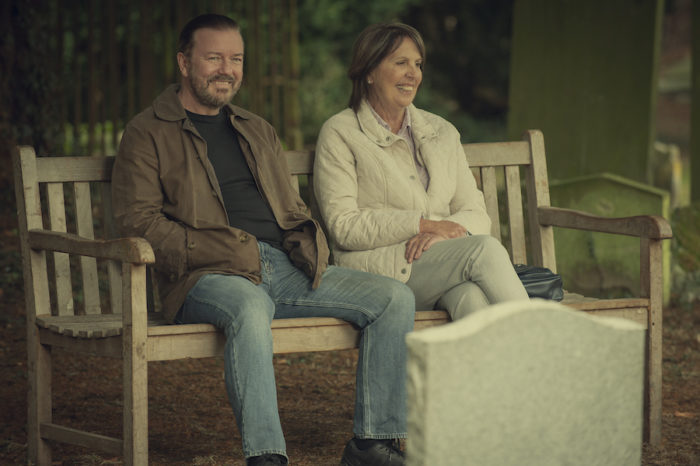Netflix UK TV review: After Life: Season 2
Review Overview
Cast and characters
8Laughs
6Progress
4David Farnor | On 24, Apr 2020
Warning: This contains spoilers for After Life Season 1. Not caught up? Read our spoiler-free review of Season 1 here.
“When Lisa died, everybody helped and saved me. I feel like I should help the people who helped me.” That’s Tony (Ricky Gervais) in Season 2 of After Life. It’s a speech that nudges the bereaved newspaper worker towards catharsis and a hopeful future, a sign that he’s started to move on from the grief he was struggling with in Season 1 – a season that ended with him acting upon his fledgling attraction to Emma (Ashley Jensen), the nurse at his father’s care home.
Season 2 picks up, though, with Tony backsliding into his grief, unable to move forwards with his and Emma’s relationship. He wants them to stay in the holding pattern they’ve established – a sort of Groundhog Day. It’s a frustrating development (or lack thereof) for her, but it’s also representative of Season 2’s own struggle. It’s a dark, low-key comedy that’s grappling with serious dramatic issues, but also wants its characters to stay in a sitcom-like limbo. The result is a show that’s unsure whether to evolve its ensemble of characters or put them in a loop.
There’s something to be said for Gervais’ decision to explore the difficulty of moving on – life, after all, is complicated, and feelings don’t just go away, depression isn’t solved with the flick of a switch. But After Life, which found such a heartfelt, moving groove in its first season that it almost didn’t need a second, doesn’t always get the balance right. The result, at its best, is a thoughtful exploration of the quagmire of loss and melancholy. At its worst, it sees Gervais simply stating out loud what Tony is thinking or feeling, often repeating something that was said in the previous season, episode or even scene.
Gervais still delivers an impressively understated performance, and him silently going through routines, interacting with his dog or watching old home videos of him and Lisa is heartbreakingly well done. Even the choice of home video is effective, as we find ourselves looking not at his and Lisa’s wedding but the wedding of Tony’s brother (Tom Basden). Basden’s gentle comic presence gets a welcome chance to take the spotlight here, as he finds his marriage now on the rocks and his newspaper under threat of closure, and the time spent growing his character really adds to the convincing environment Gervais has built around Tony.
Tony Way, too, gets more of a chance to shine as Tony’s colleague, Lenny, who is grappling with a new potential family – including his partner’s son (Ethan Lawrence), who is a little too attached to his mother and starts working as an intern at the paper. A detour into the world of amateur dramatics is diverting enough, but feels like an easy joke (Colin Hoult is clearly enjoying himself as the bitter head of the troupe), when we could be spending more time with Diane Morgan’s scene-stealing ad exec Kath, who has a thing for Tony’s brother. Mandeep Dhillon, meanwhile, is as likeable as ever as Sandy, the idealistic newcomer to the newspaper, who is still working out what she wants in life.
That sense of ennui, though, is contagious, and the laughter count is notably lower this time round. Paul Kaye as a toxic therapist is amusing but feels a little too controversial at times, leaving most of the jokes to stem from Tony’s own outbursts and rants (a yoga sequence is notably funny). These remain grounded in his own pain, and are still called out by the other characters around him, a formula that’s effective but also, well, begins to feel formulaic. Chief moral compass holder is, of course, Penelope Wilton as the woman on the cemetery bench that Tony keeps chatting to. But after so many similar conversations without evident resolutions, you find yourself looking forward to the moments with other characters instead – the possible romance between sex worker Daphne (MVP Roisin Conaty) and eccentric postman Pat (Joe Wilkinson), in particular, is a joy to witness. After Life is at its best when allowing its characters to grow in some way, rather than merely accepting a step backwards. If there’s a third season, here’s hoping that lesson sticks.
After Life is available on Netflix UK, as part of an £9.99 monthly subscription.





















